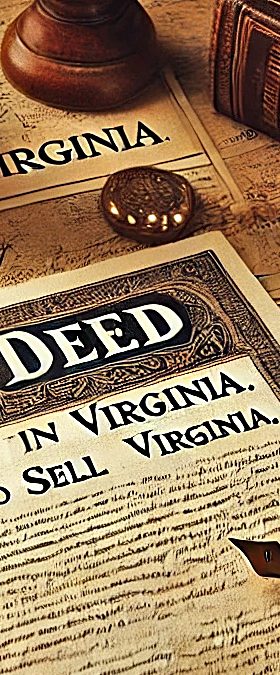
Paperwork to Sell Virginia Land: Don’t Get Stuck Without It!
Selling land in Virginia isn’t as simple as shaking hands and calling it a day. It’s a process that comes with paperwork—lots of it. If you don’t have your documents in order, your smooth sale could turn into a legal headache faster than you can say “escrow.” So, whether it’s your first time or you’re a seasoned pro, this guide will help you navigate the essential paperwork you’ll need to sell your land in the Commonwealth. Trust us—you’ll be thankful for this checklist when closing day rolls around.

Why Having the Right Paperwork Matters
Picture this: You’re at the closing table, the buyer is ready to sign, and then—BAM—you realize you’re missing a crucial document. Not exactly how you imagined celebrating your big sale, right? This is why having the correct paperwork is as important as finding the right buyer. Without the right documents, you can kiss that smooth transaction goodbye. Plus, missing paperwork can mean legal headaches down the road. Let’s avoid that, shall we?
Virginia Land Sale Paperwork Checklist
Now that we’ve established why paperwork matters, let’s get down to the nitty-gritty of what you’ll need to get that sale across the finish line. When it comes to selling land in Virginia, you can’t just show up with a handshake and a smile—you need a solid stack of paperwork. These documents not only protect you but also ensure the transaction is legal, binding, and transparent. Whether you’re selling a picturesque plot nestled in the Shenandoah Valley or a coastal gem along the Chesapeake Bay, the Commonwealth of Virginia has its own set of documentation requirements.
Here’s the checklist of the key documents you’ll need to make sure your Virginia land sale is as smooth as a glass of sweet tea on a summer afternoon.
1. The Deed: Virginia’s Ownership Blueprint
The deed is the cornerstone of your sale. In Virginia, this document officially transfers ownership from you to the buyer. Without it, well, there’s no sale. The most common type is the General Warranty Deed, which guarantees the buyer that the property is free of any legal claims or liens. There’s also the Quitclaim Deed, often used in simpler or family-based transactions, but it comes with fewer protections for the buyer. In Virginia, over 90% of real estate transactions involve a General Warranty Deed, making it the gold standard for land sales. Just like in the real estate world, deeds are serious business—don’t cut corners here.
2. Land Survey: Confirming Your Virginia Boundaries
Imagine selling land and later finding out that the buyer’s property line runs right through your neighbor’s backyard. Awkward, right? A land survey defines exactly where your property begins and ends. It ensures there’s no confusion about boundaries, easements, or other potential issues. In rural Virginia, roughly 65% of buyers request a land survey before committing to a purchase, and for good reason—it helps eliminate future disputes and sets clear expectations. It’s all about knowing what you’re selling—and what your buyer is getting.
3. Purchase Agreement: The Deal-Maker’s Contract
This document outlines the terms and conditions of the sale, from the price to any contingencies. It’s the agreement that officially binds you and the buyer to the deal. In Virginia, this document needs to be as airtight as a ship in the Norfolk Harbor, covering everything from the legal description of the land to the buyer’s ability to secure financing. A well-constructed purchase agreement can reduce transaction delays by 30%, according to a report by the Virginia Realtors Association. Without it, your sale isn’t worth the paper it’s printed on.

4. Property Tax Records: Keeping Uncle Sam Happy
Nobody escapes taxes—not even landowners. Before selling your land, you’ll need to ensure all property taxes are paid up and provide the buyer with tax records showing the property is clear of any liens. In Virginia, failure to settle property taxes can stall your sale faster than traffic on I-95. On average, 10% of real estate transactions in Virginia are delayed due to outstanding property tax issues. The good news? Once this is done, the path to closing is a lot smoother.
5. Disclosure Forms: Honesty is the Best Policy in the Old Dominion
In Virginia, it’s not just polite to be upfront about your land’s condition—it’s the law. State regulations require you to disclose any issues that could affect the value of the land, from environmental concerns to zoning regulations. Buyers don’t want surprises after the deal is done, and as the seller, it’s your responsibility to lay everything on the table.
In Virginia, failure to disclose relevant property information results in legal disputes in about 12% of land sales, according to the Virginia Department of Professional and Occupational Regulation. The good news is, Virginia’s disclosure requirements are pretty straightforward—just make sure to include anything that could impact how the buyer plans to use the land.
Additional Paperwork to Streamline Your Sale
Title Insurance Policy: Ensuring a Clear Title
Want to sleep soundly at night? Get title insurance. This protects both the buyer and you, the seller, from any legal disputes over ownership that might pop up after the sale. Title insurance is like a safety net—it ensures that if there’s an issue with the ownership history of the land, no one’s getting hit with a lawsuit down the road.
Most buyers will request title insurance, and in Virginia, it’s standard practice in about 80% of land transactions, according to the Virginia Land Title Association. Trust us: you don’t want a title dispute cropping up years after you’ve already cashed that check.
Power of Attorney: Handling Transactions Remotely
Can’t be present at the closing table? No problem. A Power of Attorney (POA) allows someone else to sign the paperwork on your behalf. This can be a lifesaver if you’re selling land from out of state or simply don’t want to deal with the logistics of closing in person. Just make sure the POA is specific to the real estate transaction—otherwise, it could create confusion.
Navigating Legal Requirements in Virginia
Understanding Virginia Land Sale Laws
Virginia’s laws cover everything from zoning to environmental regulations. For example, if your property contains protected wetlands, you’ll need to disclose that to the buyer. Zoning laws can also impact how the buyer plans to use the land, so be prepared to provide any information related to that.
According to Virginia’s Wetlands Protection Act, any land containing wetlands must follow strict guidelines for development, which could influence a buyer’s decision. Make sure you’re clear on whether your land is subject to any restrictions like this before you list it for sale.
Working with a Real Estate Attorney
It’s not a legal requirement to hire a real estate attorney in Virginia, but it can make the process smoother—especially if you’re dealing with complex legal issues like unclear property boundaries, easements, or encroachments. An attorney can ensure all the paperwork is in order and that your rights are protected throughout the sale.
How to File and Finalize Your Paperwork
Recording the Deed
After the sale is complete, the deed needs to be recorded with the local county clerk’s office. This makes the transfer of ownership official. In Virginia, recording the deed is a must, and failing to do so could result in legal issues for both you and the buyer. It’s a simple process, but one you can’t afford to skip.
Closing Documents: Sealing the Deal
At closing, you’ll sign a stack of documents to finalize the sale. This includes the closing statement, any receipts of payment, and the deed itself. Once these are signed, the sale is complete, and the buyer officially owns the land.

Common Mistakes to Avoid When Selling Land in Virginia
Incomplete or Incorrect Deeds
A deed is the foundation of your property transaction. If it’s incomplete or contains errors, your sale could be delayed, or worse—completely stalled. Mistakes such as incorrect legal descriptions or missing signatures are more common than you might think. Double-check the details or consult a professional to ensure everything is in order before signing and submitting the deed for recording
Forgetting to Pay Property Taxes
Unpaid property taxes can halt your land sale in its tracks. Before you can hand over ownership, all property taxes must be cleared. This can easily derail your closing if not handled ahead of time. Check with your local tax office to confirm everything is squared away.
Failing to Disclose Property Issues
Virginia requires land sellers to disclose any known issues that might affect the property, such as zoning restrictions, environmental concerns, or boundary disputes. Failing to disclose such details can land you in legal hot water. Transparency upfront can save you from lawsuits down the line.
Partnering with Bubba Land for Seamless Land Transactions
Buying or selling land can be a daunting task, laden with complex legal processes and extensive paperwork. At Bubba Land, we understand that your time is valuable, and our goal is to make your land transactions as smooth and stress-free as possible. By partnering with a professional land company like ours, you can avoid the pitfalls and costly mistakes that often come with navigating land deals on your own.
- No Realtor Fees or Closing Costs: Sell directly to Bubba Land and keep more money in your pocket.
- Hassle-Free Process: Skip the marketing and showings; we make direct offers for a quick sale.
- Fast Cash Offers: Get paid quickly, without the long wait.
- Straightforward Transaction: No complicated negotiations—just a simple, direct sale.
- Reduce Risk: Sell quickly to avoid long listing periods and potential property issues.
In the land business, it’s important to partner with a company that has a proven track record and a commitment to integrity. Bubba Land is dedicated to providing you with a seamless, hassle-free experience, and we pride ourselves on being a trustworthy partner in your land journey. Whether you’re looking to sell quickly for cash or need assistance navigating a complex land purchase, we’re here to help.
Conclusion on Paperwork Needed to Sell Virginia Land
Selling land in Virginia can feel like navigating a sea of paperwork, but with the right guide, it doesn’t have to be overwhelming. From ensuring your deed is accurate to providing the right disclosure forms, every document you submit is a step toward a smooth and successful sale. Missing one piece of paperwork could lead to delays or even legal troubles, but getting it all in order ensures a clear path to closing.
Think of this process as your final checklist before crossing the finish line—whether it’s settling property taxes, confirming boundaries with a land survey, or securing title insurance to protect yourself from unexpected ownership disputes. By handling these details early, you not only avoid headaches but also give your buyer peace of mind, which can help close the deal faster.
Remember, having the right paperwork in place isn’t just about legality—it’s about efficiency, transparency, and peace of mind for both you and the buyer. So take the time now to make sure every document is in order, and before you know it, you’ll be sitting at the closing table, signing off on a smooth, hassle-free sale. The quicker you check off those paperwork boxes, the sooner you’ll have that sale finalized and be moving on to your next venture.
Frequently Asked Questions (FAQs)

1. What Documents Are Needed to Sell Land in Virginia?
To sell land in Virginia, you’ll need the deed, a land survey, a purchase agreement, disclosure forms, and proof of paid property taxes. Title insurance is also often required to protect both the buyer and seller from potential ownership disputes.
2. Do I Need Title Insurance When Selling Land in Virginia?
While not legally required, title insurance is highly recommended in Virginia. It protects both the seller and buyer from any claims or disputes over the land’s ownership, providing peace of mind during and after the sale.
3. How Do I Transfer Ownership of Land in Virginia?
Ownership of land in Virginia is transferred through a deed. The seller must prepare and sign the deed, which is then recorded at the local county clerk’s office. This document officially transfers the land to the buyer.
4. What Is the Virginia Disclosure Statement for Selling Land?
The Virginia Disclosure Statement requires sellers to inform buyers of any known issues with the land, such as zoning restrictions, environmental concerns, or encumbrances. Transparency here can help avoid legal issues later.
5. How Do I Pay Taxes When Selling Land in Virginia?
Before the sale can be completed, all property taxes must be paid. You’ll need to provide proof of tax payment, as unpaid taxes can place a lien on the property and delay the sale.

Bubba Peek is an experienced real estate investor focused on land acquisition. He holds a Bachelor’s in Finance and a Master’s in Real Estate (MSRE) from the University of Florida, along with the prestigious Certified Commercial Investment Member (CCIM) Designation, held by only six percent of real estate professionals. With over a decade of experience, Bubba blends financial expertise and market insight to deliver outstanding results. As founder of Bubba Land Company, he’s known for offering landowners efficient, hassle-free sales solutions.